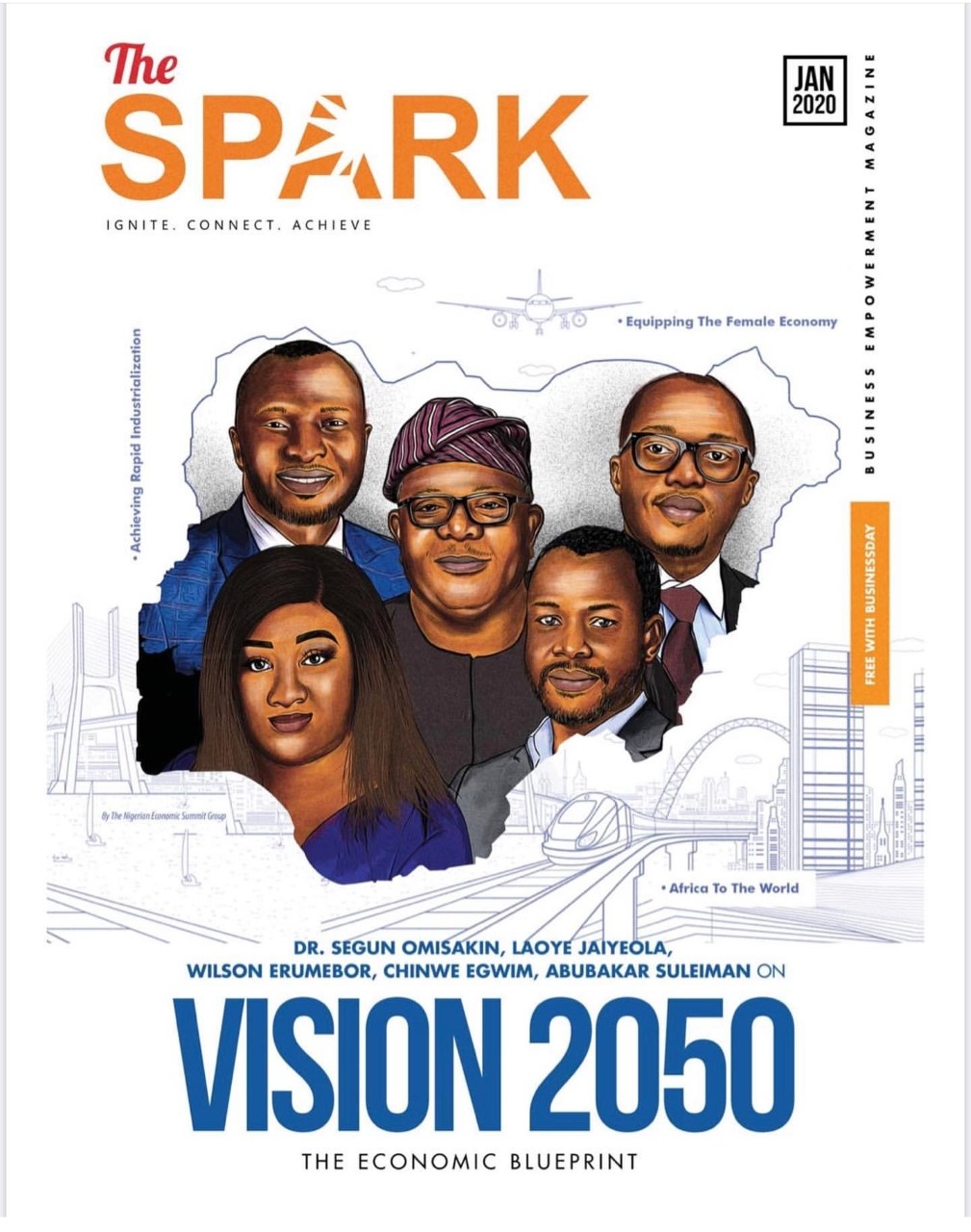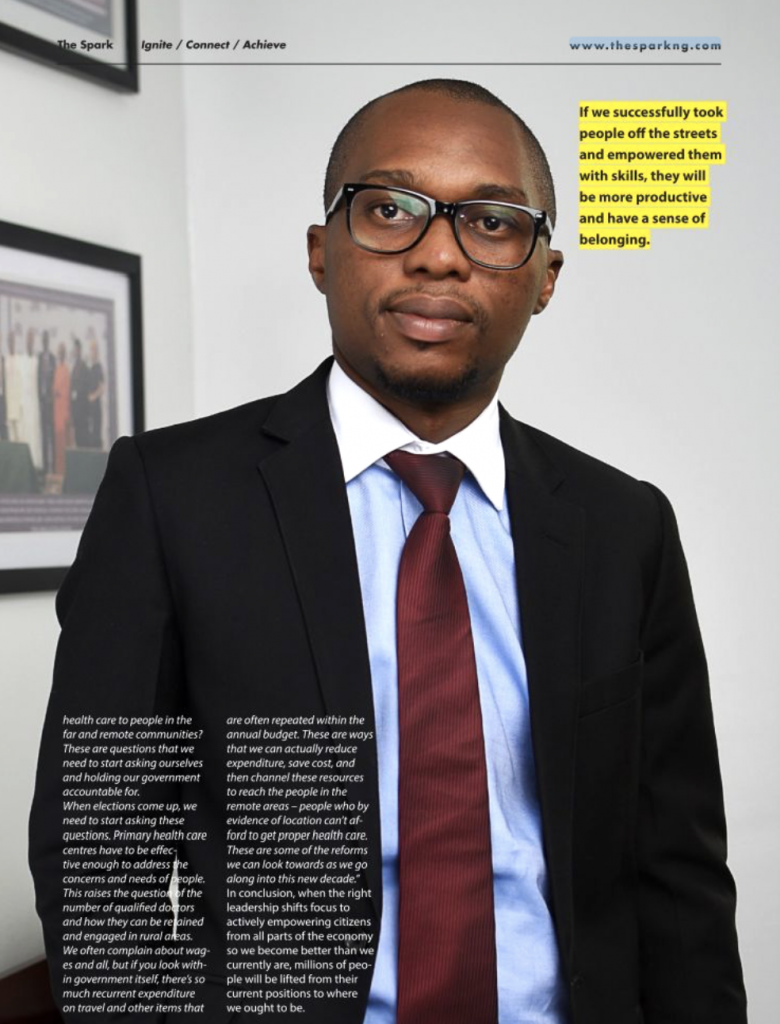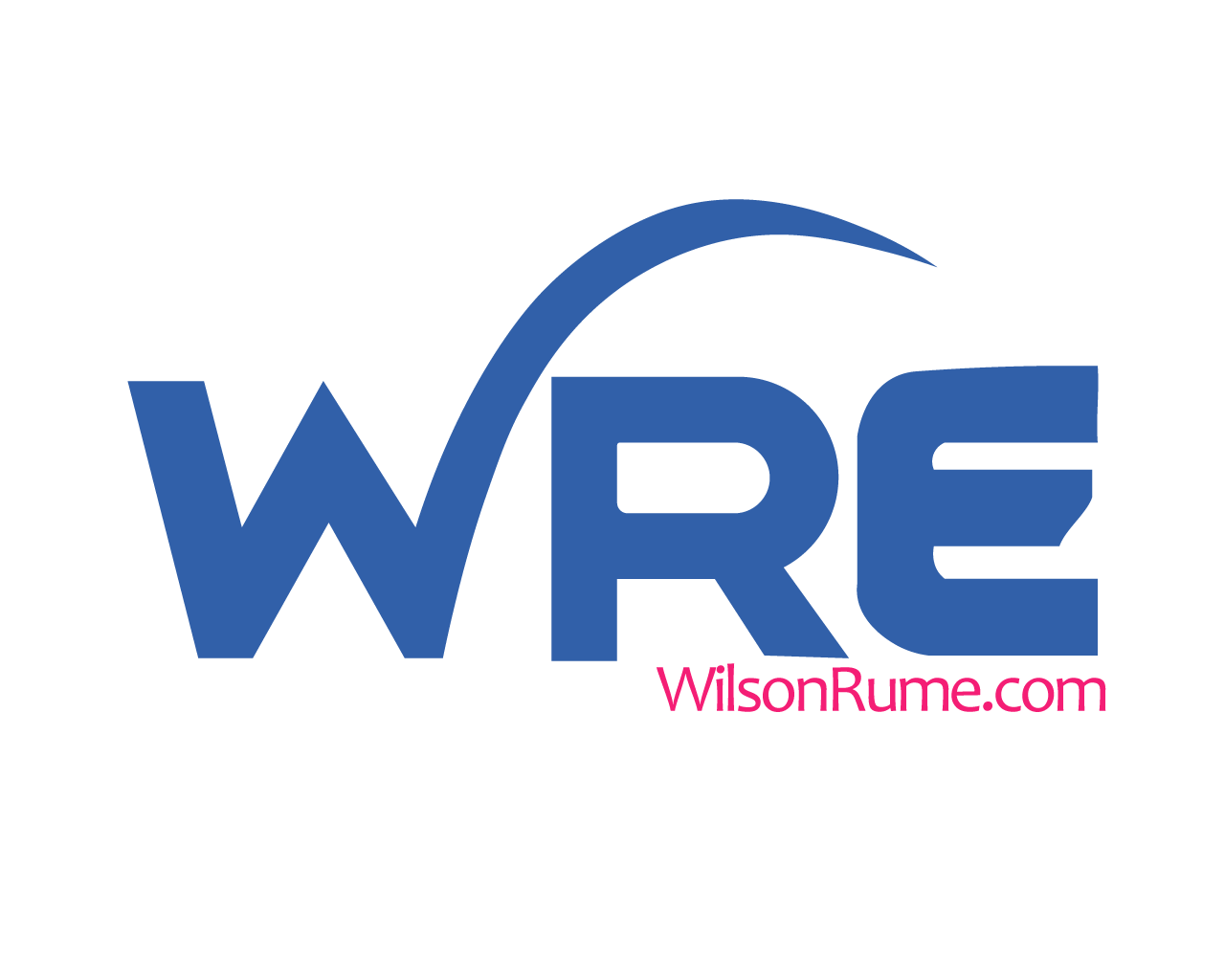
Wilson Erumebor’s Interview on Spark Magazine
Wilson Erumebor, The Economist
With over a decade of experience working with organizations that focus on Economic and Social research, Industry research, Policy advocacy, Consulting and Credit ratings, Mr. Wilson Erumebor in his interview, was open to addressing some of our concerns on poverty and how skill empowerment and social reforms through good governance can provide possible solutions to alleviating this.
PROFESSIONAL BACKGROUND
Currently the Senior Economist with the Nigerian Economic Summit Group, Wilson Erumebor focuses on research and policy advocacy on the Nigerian economy, addressing big issues of unemployment, poverty and more, across all the different sectors of the economy. With Bachelor’s and Master’s Degrees in Economics, he currently leads the preparation of NESG’s Macroeconomic Outlook and anchors the Technical Subcommittee of the Nigerian Economic Summit.
Explaining his passion for research, policy advocacy and economic development and why he has been in this profession for this long, Mr. Erumebor said “If you look at Nigeria today, the problems of unemployment, governance and poverty have always been a challenge. These problems have been consistent over the last few decades and as long as they exist, it will always be a concern for me to see how I can lend my own little voice to address some of these issues. I am always involved in using my economic thinking and intuition to propose solutions to some of these problems.”
POVERTY ALLIEVATION
Sharing his reasons as to if complete poverty alleviation is possible, he had this to say “I believe massive poverty reduction is possible and there are examples to prove this. China, for example, has lifted over 850 million people out of poverty within a few decades. Indonesia and Malaysia are other examples to prove that poverty has a solution. While it is very rare to eradicate poverty 100%, the fact remains that you can lift millions of people out of poverty.
I believe Nigeria can also do the same. Currently we have close to 90 million people living below the poverty line. That is a huge number and a huge source of worry for everyone, including business owners and citizens because, of course, poverty influences crime and other social vices. We’ve seen a lot of that happening in the last few years in the country. However, the government has a very key role to play and needs to step up. They need to make some hard and tough choices for us to be able to alleviate or address the poverty concerns in the country.”
ETHNIC DIFFERENCES
Furthermore, Poverty can be birthed through division. When favouritism based on similar traits and belief systems becomes the order of the day, some parties get deprived from receiving their due benefits. Nigeria being a nation with several ethnic groups, the need for equal access to opportunities is imminent.
Wilson commented “When people are not united, there will always be division in different forms. This affects the way we live, co-exist and leads to some form of discrimination. We have cases where a candidate is qualified for a certain position but due to his religion or background, he loses the role.
When you don’t give the right people the opportunity to express and showcase their talents and skills, you’ll end up getting unqualified people to occupy certain positions of power and authority. This is very obvious in political appointments where sometimes you have unqualified people occupy certain offices based on tribe, religion and other criteria. You then wonder if the decisions they take are founded on some level of intelligence and evidence. That of course is a challenge and it influences how decisions are made in the country.
In my opinion, if we can decide to get the right people into the right offices without bias, we would rightly approach the problem of ethnic differences. All forms of leadership, from churches, school, political authority to business owners, will need to demonstrate unity by getting the right people into available offices to make decisions that are beneficial to the majority of people.”
Thus, having the right leadership shifts the focus of the government from, “what’s in it for us?” to “what’s in it for them (the masses)?” This way, strengthening the economy becomes the new focus.
THE ROLE OF SKILL EMPOWERMENT
Mr. Erumebor, on commenting on the role of skill empowerment said “If we successfully took people off the streets and empowered them with skills, they will be more productive and have a sense of belonging. If you wake up in the morning and have a legitimate job to do, you will be more likely inspired than someone who has nothing to do. You are less likely to be involved in crime if you have a well-paying legitimate job. Yes, I know greed can influence this, but again, it reduces the chances of you doing illegitimate activities. If people are productively engaged with skills, it therefore means there will be less social vices within the society. This also has positive implication on economic output. When income increases, poverty is more likely to reduce over time. Being empowered with skills does have implications on how we co-habit as individuals in the society.”
SOCIAL REFORMS ADDRESSING POVERTY
It is said that Empowerment becomes easier when big reforms are implemented in key sectors.“We need to implement social reforms” says Wilson. ”There’s the need to address key issues in education and health care both in the north and in every part of the country. Poverty has many dimensions – there are people who live below a certain amount per day and people who don’t have basic quality of life, or access to education and quality health care. Many times, we often just focus on providing one or two incentives, mostly cash incentives to the poor.
So big reforms need to be made whether at the State level or the Federal level. We need to ask ourselves key questions like, “What kind of educational system should we develop?”, “What should our children be learning in school?”, “Why are our children not in school?”, “What do we need to change to ensure that we get them into school, keep them in school, and improve access to education?”
For health care, he continues, the same applies. In the rural areas, how can we ensure that we are able to deliver the best quality health care to people in the far and remote communities? These are questions that we need to start asking ourselves and holding our government accountable for.
When elections come up, we need to start asking these questions. Primary health care centres have to be effective enough to address the concerns and needs of people. This raises the question of the number of qualified doctors and how they can be retained and engaged in rural areas.
We often complain about wages and all, but if you look within government itself, there’s so much recurrent expenditure on travel and other items that are often repeated within the annual budget. These are ways that we can actually reduce expenditure, save cost, and then channel these resources to reach the people in the remote areas – people who by evidence of location can’t afford to get proper health care. These are some of the reforms we can look towards as we go along into this new decade.”
In conclusion, when the right leadership shifts focus to actively empowering citizens from all parts of the economy so we become better than we currently are, millions of people will be lifted from their current positions to where we ought to be.
You can click the link to read the Sparkle Magazine https://www.yumpu.com/en/document/read/63050885/vision-2050

